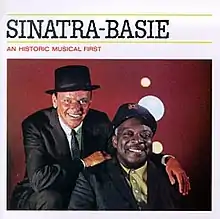Sinatra–Basie: An Historic Musical First
Sinatra–Basie: An Historic Musical First (a.k.a. Sinatra-Basie) is a 1962 studio album by Frank Sinatra, arranged by Neal Hefti.
| Sinatra-Basie: An Historic Musical First | ||||
|---|---|---|---|---|
 | ||||
| Studio album by | ||||
| Released | December 10, 1962 (LP) June 20, 1988 (CD) | |||
| Recorded | October 2–3, 1962, Hollywood, California | |||
| Genre | Vocal jazz, jazz | |||
| Length | 33:05 | |||
| Label | Reprise FS 1008 | |||
| Frank Sinatra chronology | ||||
| ||||
| Count Basie chronology | ||||
| ||||
| Review scores | |
|---|---|
| Source | Rating |
| Allmusic | |
| Mojo | |
| New Record Mirror | |
This was the first recording that Sinatra made with the Count Basie Orchestra. In 1964, Sinatra and Basie would make a final studio recording, It Might as Well Be Swing, orchestrated by Quincy Jones, and Sinatra's first live album, Sinatra at the Sands (1966) would feature the Basie band.
Sinatra appeared on an episode of The Dinah Shore Show that aired on December 9, 1962, the day before Sinatra-Basie was released, and performed the album's arrangement of "Please Be Kind".
According to Will Friedwald's book, Sinatra! The Song Is You:
- "Basie didn't play piano on several of the tracks: 'The day before the first date, we rehearsed all day, all night', said [Sinatra's longtime pianist] Bill Miller, officially serving as contractor. 'Everybody also came in an hour before so we could go over them again.' As Joe Bushkin has pointed out, 'The Basie guys could read [sheet music] as well as any studio band', but to help them nail the charts even tighter, Sinatra and Miller brought in ace lead trumpeter Al Porcino. Basie was a capable but not an expert reader, Miller continued, 'and he was very slow to learn new tunes, so on a couple of the songs, he said, "You play it."' Long story short, Bill Miller played piano on 'Pennies from Heaven.'"[4]
Track listing
- "Pennies from Heaven" (Arthur Johnston, Johnny Burke) – 3:29
- "Please Be Kind" (Saul Chaplin, Sammy Cahn) – 2:43
- "(Love Is) The Tender Trap" (Cahn, Jimmy Van Heusen) – 2:37
- "Looking at the World Through Rose Colored Glasses" (Jimmy Steiger, Tommy Mailie) – 2:32
- "My Kind of Girl" (Leslie Bricusse) – 4:37
- "I Only Have Eyes for You" (Harry Warren, Al Dubin) – 3:31
- "Nice Work If You Can Get It" (George Gershwin, Ira Gershwin) – 2:37
- "Learnin' the Blues" (Dolores Vicki Silvers) – 4:25
- "I'm Gonna Sit Right Down and Write Myself a Letter" (Fred Ahlert, Joe Young) – 2:36
- "I Won't Dance" (Jerome Kern, Jimmy McHugh, Oscar Hammerstein II, Dorothy Fields, Otto Harbach) – 4:07
Personnel
- Frank Sinatra – vocals
- Count Basie – piano
- Bill Miller – piano[4]
- Eric Dixon – flute, tenor saxophone
- Frank Wess – flute, alto saxophone, tenor saxophone
- Frank Foster – tenor saxophone
- Marshall Royal – clarinet, alto saxophone
- Charlie Fowlkes – baritone saxophone
- Al Aarons – trumpet
- Sonny Cohn – trumpet
- Thad Jones – trumpet
- Al Porcino – trumpet
- Fip Ricard – trumpet
- Henry Coker – trombone
- Benny Powell – trombone
- Rufus Wagner – trombone
- Buddy Catlett – bass
- Freddie Green – guitar
- Sonny Payne – drums[5]
References
- Ginell, Richard S. "Sinatra-Basie: An Historic Musical First". AllMusic. Retrieved 21 August 2017.
- Male, Andrew (January 2010). "This Glorious Defeat". Mojo. p. 108.
- Watson, Jimmy (9 February 1963). "Frank Sinatra, Count Basie: Sinatra-Basie" (PDF). New Record Mirror. No. 100. p. 10. Archived from the original (PDF) on 14 June 2022. Retrieved 5 August 2022.
- Friedwald, Will (1995). Sinatra!: The Song Is You. New York: Scribner. ISBN 9780684193687.
- "Sinatra-Basie: An Historic Musical First". AllMusic. Retrieved 21 August 2017.
This article is issued from Wikipedia. The text is licensed under Creative Commons - Attribution - Sharealike. Additional terms may apply for the media files.